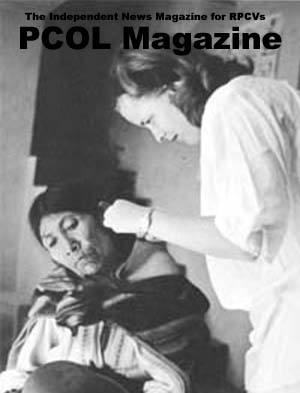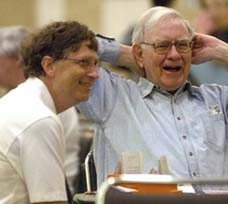
"We're seeing a rebound," says Kevin Quigley, president of the National Peace Corps Association. "Boomers want to do it all over again. It's emblematic of people who served in the '60s -- in another chapter of their lives -- but who still embody the notion of lifetime service." Older volunteers who choose to join the Peace Corps have a variety of motives. Some have a sense of moral or religious duty; others want to learn languages and new skills, broaden their horizons or gain a deeper understanding of foreign cultures; and still others are at transition points in their lives and are thinking about things they wish they'd done years earlier.
Peace Corps officials and recruiters see a growing interest among baby boomers
Peace Corps (still) wants you
Wish you'd gone years ago? Here's your second chance
By David Bernstein
Satisfaction Magazine
Dennis Young, like countless others who at one point or another have re-evaluated their lives, was struck one day by a moment of clarity: He would join the Peace Corps.
For Young, 60, a self-employed consultant from Des Moines, Iowa, this transformative moment occurred a few years ago while he and his wife, Alma, were watching "The Dancer Upstairs," a 2002 drama directed by John Malkovich. The film opens with Nina Simone's jazzy version of "Who Knows Where the Time Goes." It begins:
Across the evening sky, all the birds are leaving
But how can they know it's time for them to go?
Before the winter fire, we'll still be dreaming
I do not count the time
For who knows where the time goes?
The soulful, meditative ballad, Young says, was like chicken soup for his conflicted soul. "I was listening to the song, reflecting on my life," he recalls, "and I thought, you know, who knows where my time is going?"
Semiretired and facing a personal crossroads of sorts after a long career teaching urban studies at the University of New Orleans, Tulane and Wayne State in Detroit, Young suggested to his wife, also a professor, that they apply to serve together in the Peace Corps, preferably in Africa.
Young, an immigrant from Belize who came to the United States after his hometown, Belize City, was ravaged by a hurricane in 1961 (coincidentally, the same year that President John F. Kennedy established the Peace Corps), had long ago considered joining, but military service, graduate studies and other life commitments got in the way.
"There was never another time in my life when all the situations came together that would make it possible, in terms of obligations and other things." He says he knew "the time now is right; if it doesn't happen now, it won't happen."
Sadly, though, Alma died before they could sign up. Now, two years later, Young is even more ready to join. (His application has been approved, but he is still waiting for his assignment.) "I think it will help me in the grieving process if it helps me move on and find meaning and some new direction," he says wistfully.
Since President Kennedy created the Peace Corps to promote world peace and friendship, more than 180,000 volunteers have served in 138 countries in assignments ranging from teaching English and HIV/AIDS awareness to work on agricultural, environmental, small business and technology projects.
Scores of notable Americans have been Peace Corps volunteers, including Sen. Christopher Dodd, D-Conn., who went to the Dominican Republic; broadcaster Chris Matthews (Swaziland); author/musician/politician Richard "Kinky" Friedman (Malaysia); and Michael McCaskey, chairman of the board of the Chicago Bears (Ethiopia).
Volunteers, who live and work abroad for 27 months (including three months' training) receive small living allowances, full medical and dental care and travel to and from assignments. At the end of their stint, the Corps provides $6,000 and 18 months of discounted health insurance to help ease the transition to life back home.
It's not clear whether the number of older Americans in the Peace Corps has increased in recent years, since the Corps says it doesn't keep long-term statistics on the ages of volunteers. But of the 7,810 people currently serving worldwide, 468 -- about 6 percent -- are 50 or older. By comparison, 40 years ago, when Peace Corps membership peaked at 15,500 volunteers, older adults accounted for only 1 percent of the total.
However, Peace Corps officials and recruiters -- as well as the National Peace Corps Association, a nonprofit organization of Corps alumni based in Washington, D.C. -- see a growing interest among baby boomers. Peace Corps recruiters now regularly attend local community meetings and AARP events. In Illinois, the Peace Corps is trying to attract volunteers by advertising on radio stations with older audiences and by providing promotional materials to large membership groups such as the Illinois Municipal Retirement Fund, according to Scot Roskelley, a Peace Corps spokesman in Chicago.
Hundreds of Peace Corps veterans are also being lured back into service through groups like Peace Corps Encore (peacecorpsencore.org), which sends former volunteers back around the globe for short-term assignments, typically for stints of three weeks to three months. Since the nonprofit group was founded two years ago by a couple of Corps alumni, it has signed up nearly 700 volunteers whose passion for doing good hasn't waned.
"We're seeing a rebound," says Kevin Quigley, president of the National Peace Corps Association. "Boomers want to do it all over again. It's emblematic of people who served in the '60s -- in another chapter of their lives -- but who still embody the notion of lifetime service."
Older volunteers who choose to join the Peace Corps have a variety of motives. Some have a sense of moral or religious duty; others want to learn languages and new skills, broaden their horizons or gain a deeper understanding of foreign cultures; and still others are at transition points in their lives and are thinking about things they wish they'd done years earlier.
Regardless of the motivation, the Peace Corps' Roskelley says they're not only welcome to apply, they're eagerly encouraged. "Older volunteers bring a maturity that you don't have right out of college," he says. "What they can contribute is what the enthusiastic younger volunteer never can, and that is more work experience and lessons learned."
In 1999, when she was 64, Donna Braden of Chicago left her job as a bank trust officer for the Peace Corps. Living in Kryvyi Rig, a gritty mining city in Ukraine that's considered one of the most polluted places in Eastern Europe, Braden worked on ecology projects and taught English and ecology at a specialized high school.
Braden had wanted to live abroad again ever since a yearlong stay in Germany in the mid-'50s, while her husband was stationed there in the Army. "When I got to be 62, I thought if I was ever going to do this, I'd better hurry up and do something about it," says Braden, now 71 and divorced. "Just taking a tour or going on a three-week vacation was not what I wanted; I wanted to live in another country. And I decided the Peace Corps was probably the best way."
But it wasn't an easy decision. Braden was concerned about re-entering the job market after she returned home; she had resigned from her job because the company's leave policy "wasn't anything close to the period of time I was going to be gone," she says. (Today, she works as a communications specialist, but makes less money than at her previous job.)
"I recognized that I was making a big change and that it was probably going to be a life-changing change," she says. "And that's what it was."
Besides needing weeks to pack and prepare for her long stay in a foreign country, Braden also had to find someone to rent her condominium, move her belongings into storage and transfer all of her business affairs to her daughter.
One of the biggest obstacles, she recalls, was passing the Peace Corps medical screening process, which took her about a year-and-a-half. A medical problem doesn't automatically disqualify an applicant for the Peace Corps, says Roskelley, but certain infirmities might affect where a volunteer is sent or the particular job assignment.
Once in the Peace Corps, Braden and other older volunteers say their age doesn't matter much. In many cases, it's a definite advantage.
When Jerry and Lynne Lisenby of Peoria, Ill., served in the Corps six years ago in Paraguay, they discovered that being older -- he was 55, she was 53 when they joined -- helped them fit in better in the somewhat insular San José-mi, a tiny, remote farming community about five hours from the capital, Asuncion. Jerry, a retired fireman who'd also owned a hardware store (which he sold before joining the Peace Corps), was assigned to be a water sanitation specialist, helping to build a clean water supply system. And Lynne, a behavioral health worker, counseled children and young mothers on public health-related issues, such as dental health and HIV/AIDS, as well as teaching English.
"We were accepted immediately, where I'm not sure that happens with all the young people," says Lynne. Adds Jerry: "It's hard to have a 25-year-old girl tell a guy who's been farming all his life, 'Don't farm that way,' or 'Put a different crop in.' They just don't buy it. With me, there was a lot of respect."
And, as the only older volunteers in their training group, they also found that their younger counterparts looked up to them. "They kind of adopted us as parent figures," says Lynne. "We had a lot of lonely younger Peace Corps volunteers who found their way to our house."
One of the biggest challenges for older volunteers, the Lisenbys say, is coping with the highs and lows of Peace Corps service. For instance, Jerry says temperatures in San José-mi reached 110 to 115 degrees on most days. "I lost 50 pounds in three months," he says. As the Peace Corps' motto goes: "It's the toughest job you'll ever love."
The combination of rough living conditions, stressful -- sometimes life-or-death -- work and the pressure to learn a foreign language and fit into a foreign culture can take its toll. Some people quit early. For married couples, the experience can be especially challenging. "If it's a situation where one person is committed and the other is not, this wouldn't work," says Jerry.
But the Lisenbys' biggest concern about the Peace Corps was financial. "It's expensive," says Jerry, bluntly. "We lost a lot of money." Lynne had to take a two-year, unpaid leave of absence from her job, even as college tuition for two of their four children and other financial commitments piled up. To help pay for their volunteer pursuit, they had to rent out their home and sell their cars.
Chicagoan Constance Speake, 66, a pianist and newly retired music education professor who recently applied to the Peace Corps, says she has spent more than $2,000 for dozens of required medical and dental tests. "It just shows you I really want to go," she says.
Speake thought about signing up for the Peace Corps when she was fresh out of college in 1962, but the fledgling organization had not yet begun sending volunteers into the field. By the time it was fully up and running, Speake was already teaching and well along in her studies for a master's degree. "So, I thought, when I retire, I'll join," she says. She'll soon be off on a Peace Corps assignment to either Ukraine or Romania. Never married and with no children, Speake says the decision to volunteer was easy for her. Though the commitment will be a big challenge, she's philosophical: "Two years isn't a whole lifetime," she says.
The National Peace Corps Association's Kevin Quigley says interest among midlifers and empty nesters will likely continue to grow. Boomers, he says, are continuing to search for purpose and adventure in their lives and -- decades later -- are still inspired by President Kennedy's call to change the world.
It's a feeling that Donna Braden knows well. Since she returned home from Ukraine several years ago, she says, "People have complimented me on giving two years of my life and are like, 'Oh, you're just a wonderful person,' and all that. But I have to honestly say that Peace Corps is probably one of the more selfish things I've done in my life. I've gained a lot more than I could possibly have ever given."
Satisfaction Magazine is devoted to helping a generation make the most of an exciting new time of life. It's an indispensable guide to the new choices facing the baby boom generation, from careers and travel to fitness, money and real estate.
























